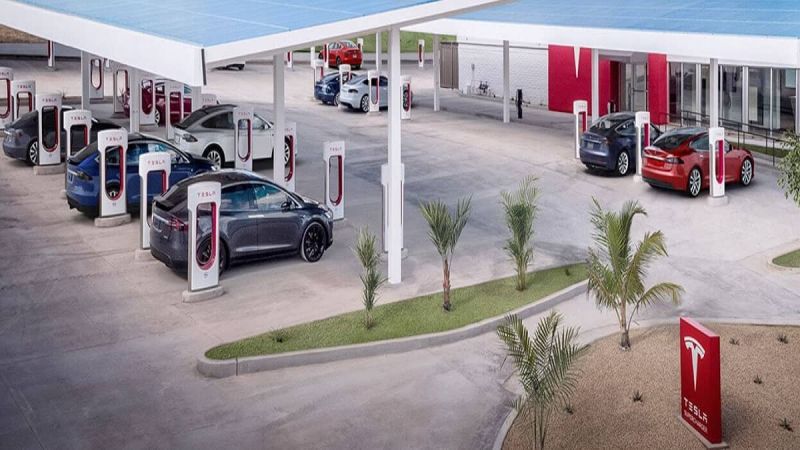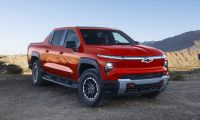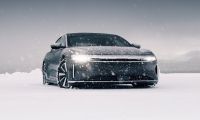Not bad, although new Model S has more range & faster charging. 3 & Y should use long range version, as Performance version is meant for max speed & handling, not max range.
Supercharger network is being upgraded to 250kW to 300kW, so that will help too.— Elon Musk (@elonmusk) July 15, 2021
Upgrades for Tesla Superchargers
To give context to this, let's revisit a recent 11 EV, 1,000 mile race that was done. In this race, a Tesla Model 3 Performance, a Tesla Model Y Performance, and a Tesla Model S Long Range were used to represent Tesla. All 3 Tesla's dominated the competition. And it wasn't even close.
For the 1,000 mile run, the top 3 finishers were
The Tesla Model S finished in 16 hours and 14 minutes (it was a long range version, no surprise here)
The Tesla Model Y finished in 17 hours and 50 minutes
The Tesla Model 3 finished in 17 hours and 55 minutes
The rest of the competition lagged far behind:
The Ford Mustang Mach-E finished in 20 hours and 31 minutes
The Porsche Taycan 4S finished in 21 hours
The Kia Niro EV, Audi e-tron, and Volkswagen ID.4 took over 23 hours
The Volvo XC40 Recharge finished in 25 hours and 47 minutes
The Polestar 2 finished in 26 hours and 52 minutes
The Nissan Leaf Plus finished in 32 hours and 57 minutes
Tesla didn't just win this race, it crushed the "competition"
Elon Musk even mentioned that the Long Range versions of the Model 3 and Model Y should have been used. The reason the long range versions of the Tesla cars should have been used is because they get more range. More range means less time stopping to charge. Had they been used, they would have been a lot closer to the top finishing Model S Long Range.
Related News: Tesla Model Y Standard Range will sell like hot cakes in China
What this upgrade means for the Supercharger Network
In optimal charging conditions, Tesla has estimated that a full charge stop for a v3 supercharger would take about 15 minutes. If you increase this by the 17% improvement from 250 kWh to 300 kWh, you get just under 13 minutes. The question is, how long does it take to fill up a tank of gas? For my current car, a Honda Fit, 2008, it takes less than 5 minutes. When a full charge on a supercharger takes 5 minutes or less, we are going to have parity speed for "filling up" a car.
In order for Tesla to get to a 5 minute charge from the current approximately 15 minutes, it would have to increase by 66%. With that percent increase, Tesla would have to get to 415 kW on its charging stations. This is definitely doable in the next 10 years, maybe the next 5 even. Time will tell. But this is one of the key benchmarks for EV's to be widely adopted and for the gas car to be completely outdone.
What do you think about this upgrade to the SuperCharger network? How long will it take Tesla to get to 415 kW and a 5 minute charge? Will range increase in the future, making it still take longer to charge?
Leave your comments below, share the article with friends and tweet it out to your followers.
Jeremy Johnson is a Tesla investor and supporter. He first invested in Tesla in 2017 after years of following Elon Musk and admiring his work ethic and intelligence. Since then, he's become a Tesla bull, covering anything about Tesla he can find, while also dabbling in other electric vehicle companies. Jeremy covers Tesla developments at Torque News. You can follow him on Twitter, Facebook, LinkedIn and Instagram to stay in touch and follow his Tesla news coverage on Torque News.
Set Torque News as Preferred Source on Google












Comments
It is a nice perk, but I
Permalink
It is a nice perk, but I think that most EV owners don't use Supercharging every day, and they just charge up overnight or once a week at home. As opposed to EV owners who can easily charge up at home, people cannot refill their gas tanks at home. So the refill ease and convenience is actually a win for EV owners who can simply charge up overnight at home. Without having to spend the time driving to a service station regularly and pumping gas. But for those Tesla owners who have the newer models that can take advantage of the new Superchargers, they will enjoy the faster charging capability.